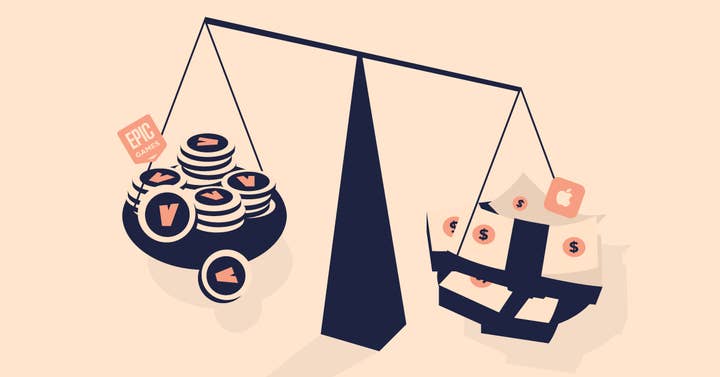Epic vs Apple: All the headlines
Judge rules in favour of Apple on nine out of ten counts, but Epic has filed to appeal
The long-awaited antitrust trial between Epic and Apple has come to a close, and GamesIndustry.biz has chronicled the biggest developments and revelations throughout.
You can find the biggest stories via our dedicated feed, or read through the comprehensive roundup on this high-profile case below.
Contents
- The road to court
- The opening statements
- Technical difficulties
- Fortnite is a metaverse, not a game
- Sweeney unsure how an Epic win would impact non-gaming apps
- Financial revelations from Epic Games Store and Fortnite
- Epic cut a deal with Sony on cross-platform play
- Fortnite may return to iOS - but not on the App Store
- Xbox has never made a profit on its consoles?
- Epic pushed Xbox to drop subscriptions for multiplayer
- Fortnite has attracted the FTC's attention
- Epic reportedly offered Sony $200m for exclusives
- Apple questions Xbox testimony's credibility
- Epic claims Fortnite needs mobile to grow
- Week One In Review: Epic still faces an "uphill battle" - plus the most absurd quotes and stats
- Apple rejected 1m 'problematic' apps in 2020
- Sony, Nintendo, Spotify ask court to protect confidential information
- Epic opposes Apple's credibility motion, Microsoft to follow
- Epic grills Apple expert on "frictionless" outside-app spending
- Developers weigh in on the big debate: what is a game?
- Roblox decides it's not a game anymore
- EU won't let trial affect its own antitrust investigation into Apple
- Only 23% of iOS games will be affected by trial
- Week Two In Review: Does the judge have a solution in mind?
- Apple doesn't know if the App Store makes a profit
- 62% of all App Store revenue generated by gaming
- Apple spent $1m on Fortnite marketing
- Apple asks court to disregard Epic's iOS "essential facility" complaint
- Apple explains core differences between iPhone and Mac security
- Apple CEO Tim Cook takes to the stand
- The closing statements
- The judge's ruling
- Apple won't let Fortnite back on App Store
The road to court
It's safe to assume anyone following coverage of the trial already knows much of the background, but here's a short summary of how the two companies got to this point:
In August 2020, Epic Games added a hotfix to the mobile versions of popular battle royale game Fortnite that introduced the ability to make payments directly to Epic when purchasing the in-game V-Bucks currency.
This subverted the 30% commission both Apple and Google take from purchases made through their app stores, violating their developer agreements and prompting both firms to remove Fortnite from their respective marketplaces.
Epic responded with both a video to its audience -- satirising Apple's 1984 ad and painting the iPhone maker as a tyrannical dictator -- and antitrust lawsuits against both Apple and Google. It was a calculated move, one we now know was referred to as Project Liberty behind the scenes.
Epic's key complaints are around the 30% commission on all payments and the inability to take direct payments, although there has also been discussion of opening up Apple's tighter ecosystem to allow alternative app stores.
The 1984 video was controversial, with debate as to whether it was weaponising Fortnite's young audience -- something exacerbated by the #FreeFortnite in-game event Epic ran a few weeks later.
In addition to removing Fortnite, Apple attempted to terminate Epic's developer accounts, which endangered any studios using Epic's Unreal Engine to power their apps. The engine provider fought back and won a restraining order that protects Unreal Engine, but Epic's developer account was terminated and Fortnite remained blocked.
Apple also filed a countersuit, dismissing Epic's case as "nothing more than a basic disagreement over money."
Both sides declined a trial by jury and the trial was set for May 3, 2021.
The judge assigned to the case, Yvonne Gonzales Rogers, has warned that -- given Epic's desire to open up the iOS ecosystem to other stores -- this dispute could have "serious ramifications" for platforms such as PlayStation, Xbox and Nintendo.
Epic has also filed against Apple and Google in Australia and the UK, and Apple in the European Union. The UK competition tribunal blocked Epic's case against Apple but allowed the Google suit to proceed.
The case against Google has had a lower profile. Google has requested that courts not connect it to Epic vs Apple and even asked for the trial to be delayed until October 2022, although this was rejected.
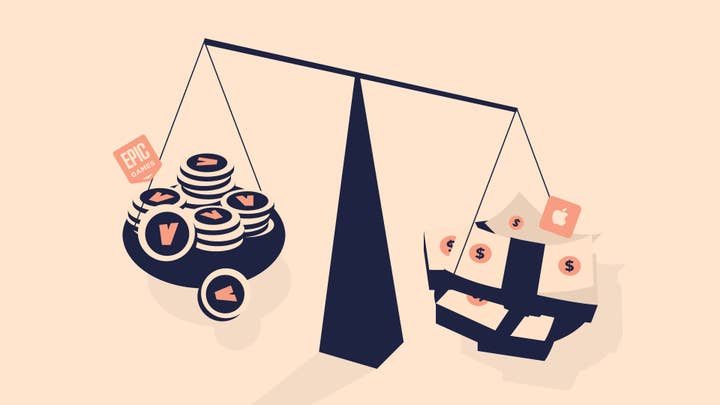
The opening statements
Both Epic and Apple laid out their key arguments in their opening statements on Monday, with the former questioning many of the policies behind the iOS App Store while the latter stressed the harm an Epic victory could cause consumers.
Epic labelled iOS as anti-competitive and cited Apple staff -- including previous CEO Steve Jobs -- who discussed 'locking' consumers into the ecosystem. It also said the cut Apple takes from purchases across the full breadth of the App Store is arbitrary and inconsistent (applying to digital goods but not physical, not applying to subscriptions until Apple decided it did, etc.).
Apple, meanwhile, argued the App Store's business model and policies actually improve consumer choice and stressed how Epic itself has benefitted from the store, including the money it has already made from Fortnite (more than $750 million on iOS alone, according to Apple). It also disputed Epic's definition of a single market -- and definitions are going to be key to how this case plays out.
Technical difficulties
The first day of the trial did not run entirely smoothly. For one thing, someone failed to mute all viewers on the conference call, reportedly leading to 20 minutes of young fans calling for the courts to "free Fortnite."
Some documents related to the case were also accidentally released alongside those intended to be made publicly available. Judge Gonzales Rogers would say the following day that there was no point resealing them after the leak.
Fortnite is a metaverse, not a game
After the opening statements, Epic CEO Tim Sweeney was called to the stand. In addition to reiterations of Epic's main arguments, this part of the session saw Sweeney describe Fortnite as a metaverse rather than a video game, claiming it's "a phenomenon that transcends gaming," according to The Verge.
He compared the battle royale to the notion of a metaverse as described in Neal Stephenson's novel Snow Crash, and the session explored the use of in-game concerts as an example.
Meanwhile, Protocol reports Sweeney hinted at the vision for Fortnite's far-flung future, with a focus more on creation than competition.
"The long-term evolution of Fortnite will be opening up Fortnite as a platform for creators to distribute their work to users ... and creators will make the majority of profits," the CEO said.
"With Apple taking 30% off of the top, it makes it very hard for Epic and creators to exist in this future world."
The metaverse concept is one Sweeney has spoken about for years. He touched on it at a 2017 Devcom keynote -- where he also spoke out against app store's 30% commissions for the first time -- and told GamesIndustry.biz just last year that the metaverse "is going to happen."
More recently, Epic's metaverse ambitions won over investors -- including Sony -- who poured another $1 billion into its long-term vision.

Sweeney is unsure how an Epic win would impact non-gaming apps
Throughout the build-up to this trial, Epic Games and Sweeney in particular have positioned this fight as one being made on behalf of all developers, not just of games but of other apps - hence Epic's role in helping to form the Coalition for App Fairness.
But the monetisation models at play on the App Store go beyond just those used in Fortnite and other games, with dating, health and messaging apps used as examples during the trial of businesses that could be impacted by the changes Epic hopes to make.
When questioned about whether he understood the ramifications this case might have for such apps, Sweeney responded: "I personally do not."
The Coalition For App Fairness is currently pushing for state-specific bills to deflect the 30% fee on both Apple's App Store and Google Play. While the bill failed in North Dakota, it made some progress in Arizona.
Inside the Epic Games Store and Fortnite
The first day's discussion also covered the Epic Games Store, its business model and whether or not it's profitable -- something Apple called into question before the trial began. Sweeney confirmed the store is "hundreds of millions of dollars short of being profitable" but expects it to turn a profit "within three or four years."
Several documents emerged alongside the trial that go into more detail around Epic's various businesses. One performance and strategy review of the Epic Games Store revealed the particulars of the $146 million Borderlands deal as an example of how Epic secures exclusives, and the $11.7 million spent on games it would give away freely on a weekly basis.
Another document gave more insight into the finances of Fortnite, revealing the popular multiplayer game generated more than $9 billion in the space of two years.
GameDiscoverCo's Simon Carless has written a more in-depth analysis about what we can learn from revelations around the Epic Games Store and Fortnite.

Epic cut a deal with Sony on cross-platform play
Some of the revelations from this case may not be specific to Apple and Epic, but have given more insight into certain behind-the-scenes agreements around the games industry.
Perhaps the most interesting is the fact that Sony would only allow cross-play functionality between Fortnite players on PS4 and those on other platforms if it could charge Epic an additional royalty to "offset the reduction in revenue."
Rather than fighting that position as it has with Apple, the Fortnite firm instead agreed. Our contributing editor Rob Fahey argues here that this is a smart solution to a complex problem.
Fortnite may return to iOS - but not on the App Store
Graphics card specialist Nvidia was called as a witness this week, due in part to the company's collaboration with Epic Games on adding Fortnite to its streaming service GeForce Now.
This was first reported last year, but has since been confirmed during the trial by Nvidia's Aashish Patel, according to iMore.
GeForce Now is not available on iOS as a native app, instead released as a web app for Safari due to Apple's restrictions on games streaming services being released through the App Store.
Adding Fortnite to the service means that iOS users would be able to play the game, albeit via cloud streaming, for the first time since it was removed back in August. Patel suggested the game could return to iOS in October.
The trial also explored Microsoft's own difficulties bringing its games streaming service, Project xCloud, to iOS -- more on that below.
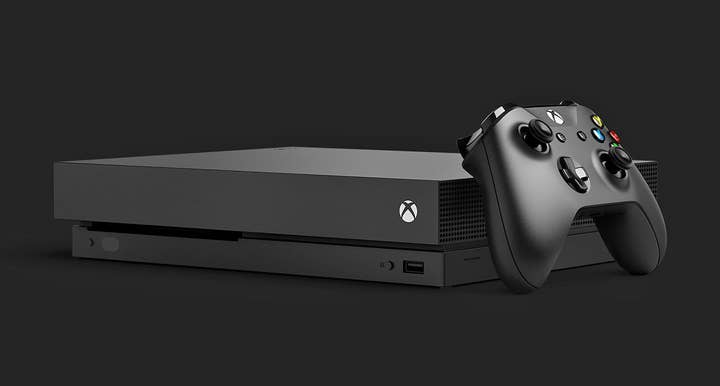
Xbox has never made a profit on its consoles?
The third day of the trial began with Lori Wright, Microsoft's vice president for gaming, media and entertainment, on the stand.
Wright discussed Microsoft's business model, and was asked about the profitability of Xbox consoles. She confirmed that Microsoft does not and has never made profit from sales of its consoles, but added that the revenue from subscriptions and commission from digital sales -- a 30% cut, same as Apple -- offsets this.
It's worth noting that Wright moved to Microsoft's gaming business in October 2019, having previously worked on Office 365 apps. She testified that Xbox consoles were designed for gaming only, omitting the TV, video and web functionality Microsoft pushed so heavily at the announcement of the Xbox One.
Wright also discussed the troubles Microsoft has encountered bringing its games streaming service Project xCloud to iOS. Last summer, it emerged that Apple significantly limited the test and ultimately rejected the app, claiming its security policies required all games to be reviewed individually. Microsoft has since found a workaround, running xCloud as a browser web app.
During the case, Wright reiterated Microsoft's previous comparisons to other subscriptions and streaming services on iOS, observing that Apple does not require Netflix to review every film and TV episode in its library.
The conversation also touched on the recent reduction in the Microsoft Store's commission on PC, brought down from 30% to 12%. Wright reiterated that, as Microsoft has stated, there are no plans to adopt this model on its consoles.
Epic pushed Xbox to drop subscriptions for multiplayer
Microsoft crops up elsewhere in the documents released around the trial as an email chain reveals that Sweeney tried to get the company to remove the requirement for an Xbox Live Gold subscription when it comes to free-to-play multiplayer games in time for Fortnite's removal from the store.
Xbox eventually dropped this restriction last month, but Sweeney asked Phil Spencer directly if it could be tied in with "certain plans" the Fortnite firm had for August, ones that would "provide an extraordinary opportunity to highlight the value proposition of consoles and PCs, in contrast to mobile platforms, and to onboard new console users."
Spencer declined, to which Sweeney responded that the Xbox boss would "enjoy the upcoming fireworks show."
Fortnite has attracted the FTC's attention
On the fourth day of the trial, an Epic Games executive revealed the success of Fortnite had prompted requests from the Federal Trade Commission over privacy practices.
Thomas Ko, Epic's head of business and strategy for online services, confirmed he was asked by the FTC about the security of customer information.
Ko was asked about whether there had been issues surrounding the improper collection of data from players under the age of 13, but further details were discussed in a sealed session.
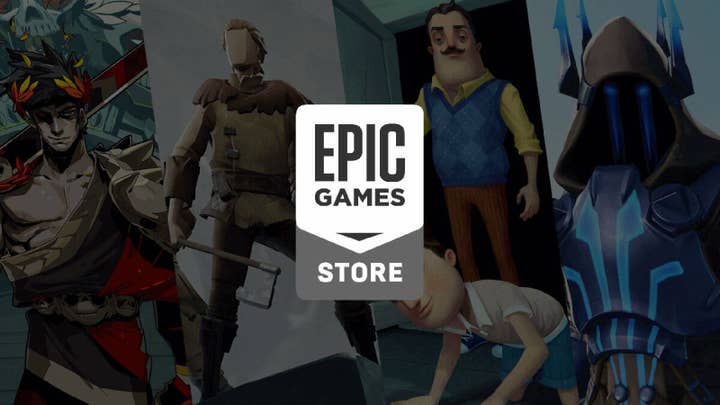
Epic Games reportedly offered Sony $200 million for exclusives
More leaked documents, more insight into the finances behind Epic's strategy to grow its online games store. A new file from September 2020 surfaced that indicated Epic Games has proposed to pay Sony around $200 million to get multiple PlayStation exclusives onto the marketplace.
The document also reveals attempts to secure exclusive games from Microsoft, although this appears to have been turned down due to concerns over competition with Xbox Game Pass on PC.
Epic Games even reportedly considered approaching Nintendo, although the company recognised this was a "moonshot unto itself."
Apple questions Xbox testimony's credibility
Following a session with Xbox's Lori Wright in the first week, Apple filed for the court to make an adverse credibilty finding concerning her testimony.
While Wright apparently testified she had relevant documents to back up her claims -- including that Microsoft sells Xbox consoles at a loss -- Apple argues that Microsoft has "intentionally withheld" these, preventing it from doing a thorough cross-examintion and bringing into question the credibility of Wright's statements.
It's worth noting that Apple previously tried to block Wright -- and two other witnesses from Facebook and Yoga Buddhi -- from the trial, claiming their employers were "publicly aligned" with Epic Games.
Epic claims Fortnite needs mobile to grow
With all the focus on 30% commission fees and speculation about Epic (or anyone else) launching a rival marketplace on iOS, it can be easy to forget that the company is also fighting to get Fortnite restored to Apple's App Store.
That plea could be found between the lines of the testimony by Matthew Weissinger, Epic's marketing director, who claimed that mobile represents the biggest growth opportunity for the game now that it has reached "full penetration" on console.
Weissinger also reported there were 2.5 million daily active users -- "about 10%" of the game's daily audience of approximately 30 million -- and that the loss of the iOS version had "severed friendships."
Week one in review: Epic still faces an "uphill battle"
The first of our weekly panels with legal experts saw two attorneys discussing the initial proceedings, acknowledging the steep challenge Epic has in making its case.
The pair weighed up which of Epic and Apple's strongest arguments had been, offered context around some of the most interesting testimonies and gave an idea of what to expect in the next stage of the trial. You can read the full article here.
We also collated the most absurd statistics and quotes from the first week of the trial in our regular This Week In Business column.
Examples include the notion that Minecraft isn't a game, Sony's lack of cross-play was tearing friendships apart, and that Apple taking 30% of all transactions is making the world a better place.
Finally, we share our own thoughts on the trial and which side is making the strongest argument (so far) on an episode of The GamesIndustry.biz Podcast.
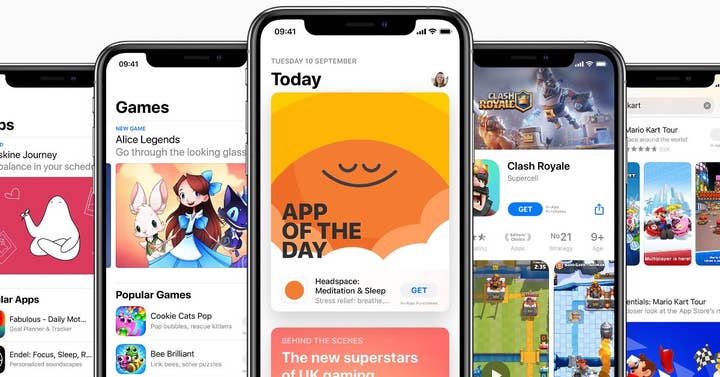
Apple rejects one million 'problematic' apps in 2020
One of Apple's key defenses in this trial, particularly when justifying the 30% commission fee Epic continues to criticise, has been the effort it puts into security for its App Store. So it's a matter of convenient timing that the company released new statistics, separate from court proceedings, on what its store team has been dealing with.
The company said that last year it rejected close to one million 'problematic' new apps, and a similar amount of new updates. More than a fifth of the rejections were for privacy violations, while others were for spam, copycats, hidden or undocumented features and more.
Additionally, Apple said it protected customers from more than $1.5 billion "potentially fraudulent transactions" in 2020, and blocked one million accounts from being able to make transactions -- again, timely findings given its dispute with Epic over payment processing system.
Sony, Nintendo, Spotify ask court to protect confidential information
Following the aforementioned leak at the very beginning of the trial, several companies across the games industry and beyond have requested that certain documents with sensitive information about their businesses and products be sealed or redacted.
Among those issuing such requests were Sony, Nintendo, Samsung, Spotify, Roblox and PayPal, with Epic and Apple adding a few requests of their own.
Judge Gonzales Rogers has granted most of these, but notes that since some of the information they seek to protect was already exposed -- especially in the case of Sony -- "the bell has already rung.
Epic opposes Apple's credibility motion, Microsoft to follow
The Fortnite firm has responded to Apple's call for the court to further investigate the credibility of the testimony by Microsoft's Lori Wright.
Epic has even sent a proposed order for the judge to sign, denying Apple's motion for an adverse credibility finding.
Microsoft is also understood to be working on a response, with a deadline of May 17.
Epic grills Apple expert on "frictionless" outside-app spending
During cross-examination of Apple's expert economist Professor Lorin Hitt of the University of Pennsylvania Wharton, Epic's counsel pressed Hitt on his assertions that mobile game makers often allow iOS users to buy in-game currency through the iOS Safari browser instead of through the app itself, avoiding Apple's 30% commission in the process.
While Hitt had testified that games like Candy Crush Saga and Clash Royale allowed such functionality, attempts to buy their currency through a browser in court didn't get very far, and Hitt couldn't explain how the transactions were possible.
Hitt ultimately said his research team had determined how it was possible and he stood by their findings. The judge noted this didn't help his assertions about how easy a process it was for consumers.

Developers weigh in on the big debate: what is a game?
Rather than letting the lawyers have all the fun, we reached out to developers and other industry professionals to get their take on one of the case's central arguments: what defines a game. You can read their thoughts, both serious and silly, right here.
Roblox decides it's not a game anymore
A number of changes were noticed on Roblox's website, echoing Apple's earlier argument in court as to why the mobile giant doesn't consider the app to be a video game.
The word 'game' on the site has been replaced with 'experiences', the term 'max players' with 'max people', and the 'Games' tab on the site now reads 'Discover' -- although the URL still refers to games.
A Roblox spokesperson told The Verge: "The term 'experiences' is consistent with how we've evolved our terminology to reflect our realization of the metaverse. Roblox is an online community where people do things together in virtual worlds, and over the years, we began referring to these worlds as experiences, as they better represent the wide range of 3D immersive places - from obbys to virtual concerts - that people can enjoy together with their friends."
The Verge notes that Roblox has described its product as both an 'experience' and a 'metaverse' before, but it's notable that the change occurs during the Epic vs Apple trial, the outcome of which could significantly impact what happens to games on the iOS mobile platform.
EU won't let trial affect its own antitrust investigation into Apple
The European Commission has said it's watching the Epic vs Apple trial, but intends to focus solely on its own findings as it conducts its own investigation into Apple.
Speaking to Bloomberg, the European Commission's executive vice president Margethe Vestager said the bloc is "following [the trial] very closely" but adds: "We would have to do our own thing, no matter the outcome of the US casework."
The European Commission is currently building an antitrust investigation into Apple Pay, in part because the system is the only payment solution that can use the iPhone's near-field communications tech for contactless payment.
This is separate from the antitrust complaint Epic has filed against Apple with the European Commission's Directorate-General for Competition -- part of its ongoing efforts to take this case to different markets around the world.
Only 23% of iOS games will be affected by trial
As the trial entered the final week and shifted towards Apple's defense, the iPhone maker's first witness gave more insight into how many games could be impacted by any ruling.
Apple Fellow and former exec Phil Schiller claimed only 17% of iOS games are freemium like Fortnite, with a further 6% using a premium (an upfront purchase, although some will also have microtransactions). These represent less than a quarter of the App Store's games.
However, it's worth reiterating that any ruling about Apple's 30% commission will also impact non-games apps.
Week Two In Review: Does the judge have a solution in mind?
The second week of the trial focused primarily on what our legal panel described as the "battle of the experts," with both Epic and Apple bringing out economists to back up their arguments.
However, perhaps the most interesting aspect that began to emerge this week was the judge's line of questioning, interjecting and tackling both parties herself -- and the subtext of her inquiries might suggest potential solutions to the dispute, or at least ones that she is considering.
Apple doesn't know if the App Store makes a profit
As Epic continued questioning Apple Fellow Phil Schiller, the iPhone firm's witness claimed that it's still unknown whether the iOS App Store is profitable.
"We don't deny that it likely is," Schiller told the court, but added that Apple has never broken down its finances to the point where it can fully identify whether the App Store makes more than it costs to run.
During this session of the trial, Schiller confirmed that Apple's 30% commission fee had generated more than $20 billion for the company between 2008 and 2017.
62% of all App Store revenue generated by gaming
Apple's App Store is fueled by gaming, with the majority of revenue allegedly generated by game purchases on the platform.
The figure was given by Apple antitrust expert Lorin Hitt, who also shared that the average in-game purchase price double from $5 to $10 following Fortnite's arrival on the App Store in 2018.
Hitt also highlighted that between March 2018 and July 2020, 10.2% of Fortnite players played on iOS, generating 13.2% of all Fortnite revenue -- $745 million out of a total $5.6 billion.

Apple spent $1m on Fortnite marketing
Apple head of games business Michael Schmid took to the stand on day 13, discussing how Apple worked closely with Epic on engineering and marketing efforts around Fortnite.
As part of his testimony, Schmid claimed that Apple spent just under a million dollars in marketing Fortnite in its last 11 months on the App Store. Apple also made "over $100 million" in commission from Fortnite while it was available.
Schmid also noted the relationship between the two companies became "a never-ending crescendo", with Apple staff receiving calls in the early hours of the morning and even on Christmas day to help fix issues with the popular battle royale.
Apple asks court to disregard Epic's iOS "essential facility" complaint
Ahead of the trial, Epic claimed that Apple was denying the company an "essential facility" by not allowing Fortnite on the App Store.
However, Apple claimed that Epic did not successfully make its case on the matter.
The iPhone maker also argued that it has not denied Epic access to iOS because the company does still have access to it, under the terms of Apple's developer agreement.
Apple explains core differences between iPhone and Mac security
On Wednesday, Apple software engineering head Craig Federighi testified in court, and was tasked with explaining the key security differences between iPhone and Mac operating systems.
Federighi argued that a higher number of iPhone users paired with the sensitivity of the data they keep -- such as contacts, passwords and location -- makes iOS an attractive target for attackers.
He also said that iPhone users are much more susceptible to malicious attackers due to varying levels of technological literacy.
Apple CEO Tim Cook takes to the stand
The head of Apple, Tim Cook, spoke to the court on the last day of testimony and -- as you might expect from the CEO of a trillion-dollar company -- didn't really say much.
During Cook's two-hour session, he claimed that he didn't know whether the App Store was profitable (but has a gut feeling that it is), insisted that the store's Small Business Program and its 15% commission fee was introduced to help developers during COVID rather than as a response to Epic's attack on its standard 30% fee, and denied that Google was Apple's competitor -- despite labelling it as such as recently as 2019.
However, he did address the notion of allowing third-party stores onto iOS -- a possible outcome of this trial -- saying it would be "terrible" and cause "huge convenience [and] fraud issues."
The closing statements
After three weeks of testimonies, leaked documents and technical difficulties, the antitrust trial between Epic and Apple came to an end.
Both sides were allowed to make closing statements, with Epic focusing once again on Apple's tight control over its ecosystem and apparent refusal to allow what the Fortnite firm would deem to be fair competition.
Meanwhile, Apple emphasised the consequences Epic's proposed changes might have on both the iOS ecosystem and the broader mobile market in general, disputing its systems were any different to those of other dedicated platform holders.
Judge Gonzales Rogers said she would deliver her decision in writing, but warned it will take some time as there are not only thousands of pages of evidence and testimony to review but also thousands of other cases for her to deal with.
The judge's ruling
Months after the close of arguments, Judge Gonzalez Rogers issued a verdict siding with Epic Games on just one of the ten counts it was seeking against Apple.
The judge found Apple in violation of California's Unfair Competition Law, and issued a permanent injunction against Apple.
Starting December 9, Apple will no longer be allowed to stop developers from including external links, metadata buttons, or other calls to action that point users to places where they can pay for services without Apple taking a cut of the revenues. In addition, developers will be allowed to reach out to customers directly through any contact information given to them when users register a new account via an app.
Judge Gonzalez Rogers also sided with Apple's counterclaim alleging a breach of contract by Epic, and ordered the Fortnite makers to pay Apple 30% of all revenues it collected directly through the iOS app since taking that option live in August of 2020.
Epic Games CEO Tim Sweeney said the ruling "isn't a win for developers or for consumers," and promised that the company "will fight on."
Following Sweeney's comment, Epic Games had filed to appeal against the ruling.
Within her ruling, Judge Gonzales Rogers also weighed in the whole 'What is a game?' debacle, following various attempts by both sides to define the term in a way that best strengthened their arguments. As spotted by Rock Paper Shotgun, she reasoned:
"At a bare minimum, video games appear to require some level of interactivity or involvement between the player and the medium. In other words, a game requires that a player be able to input some level of a command or choice which is then reflected in the game itself.
"This gaming definition contrasts to other forms of entertainment, which are often passive forms enjoyed by consumers (eg. films, television, music). Video games are also generally graphically rendered or animated, as opposed to being recorded level or via motion capture as in films and television."
We'll be expanding this article with future updates, and you can follow our ongoing coverage of Epic vs Apple right here.
Apple won't let Fortnite back on App Store
Two weeks after the judge's ruling, Epic CEO Tim Sweeney released a pair of emails revealing that the Fortnite maker paid Apple $6 million in money owed, as per the court order, but will not yet be allowed to return Fortnite to the App Store.
"Apple has exercised its discretion not to reinstate Epic's developer program account at this time," Apple's legal counsel said. "Furthermore, Apple will not consider any further requests for reinstatement until the district court's judgment becomes final and nonappealable."
Epic filed a notice of appeal days after the original ruling, and Sweeney said exhausting the process in full could take as long as five years.
